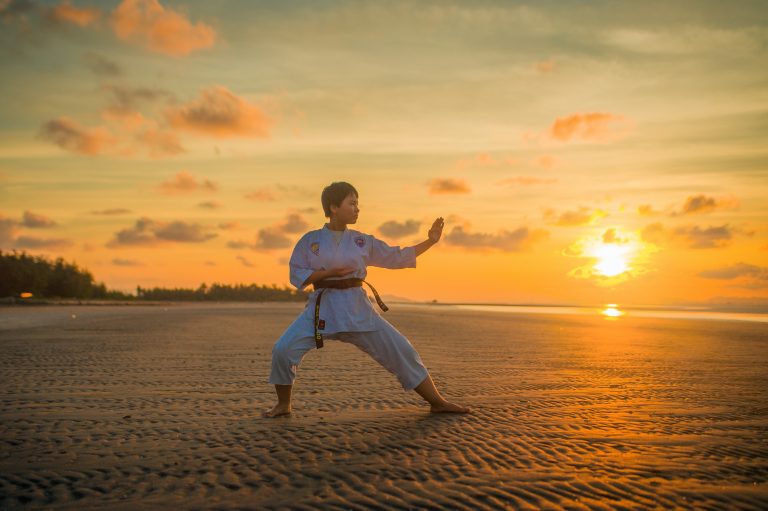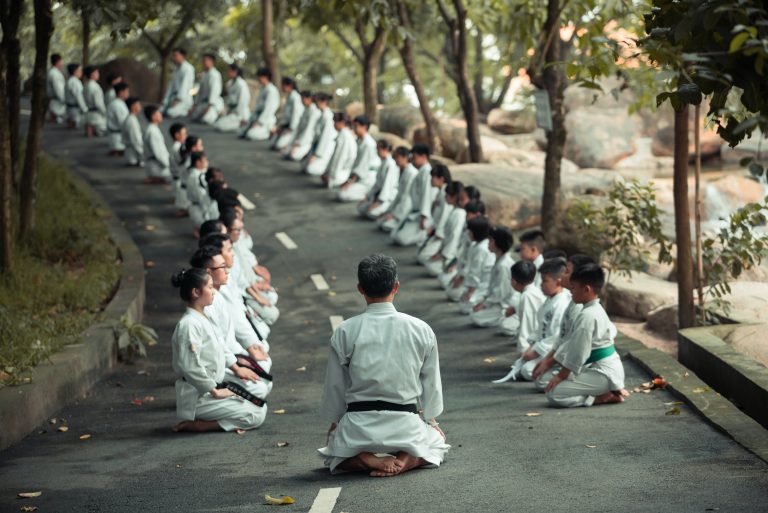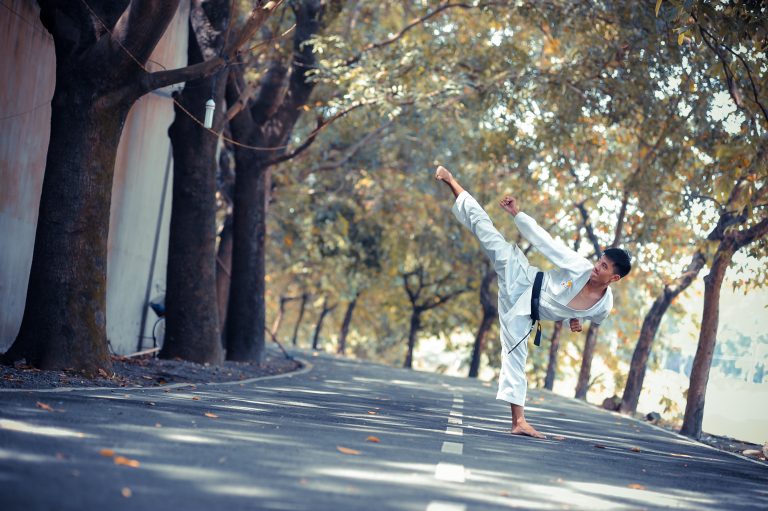Mixed Martial Arts vs Karate: Which Martial Art is Right for You?
When it comes to martial arts, the sheer number of options can be overwhelming – especially if you’re just starting out. While traditional martial arts like karate have been around for centuries, more contemporary martial arts like mixed martial arts (MMA) have recently come to the forefront. Both karate and MMA have their respective strengths and weaknesses, so how do you decide which one is right for you? Let’s take a closer look.
The Basics of Karate
Karate is a Japanese martial art that emphasizes striking techniques using kicks, punches, and knee and elbow strikes. It also includes joint locks and throws, although these are not as central to the art. What sets karate apart is its emphasis on developing a strong character and values through rigorous training. It is often seen as a traditional and formal martial art.
Karate is typically practiced in a dojo with a belt ranking system – from white belt (beginner) to black belt (expert) – that signifies a student’s level of skill and dedication. Students must learn and memorize a set of forms (kata) that contain many techniques and moves, which they perform solo or with a partner.
The Basics of Mixed Martial Arts
MMA is a modern combat sport that combines techniques from various martial arts, including karate, boxing, Brazilian Jiu-Jitsu, and wrestling. MMA fighters can use a wide range of striking techniques as well as grappling and submission techniques. They fight in an Octagon ring and the goal is to either knock out the opponent or make them submit.
MMA is often seen as a more practical and effective form of martial art because it emphasizes a realistic approach to fighting. It is also considered one of the most physically demanding sports in the world, requiring a combination of strength, endurance, and functional mobility.
Differences in Training and Techniques
While both karate and MMA involve striking techniques, they differ greatly in terms of training and techniques. In karate, training is focused on perfecting pre-determined forms (kata) and using them in sparring matches (kumite). Karateka spend years perfecting individual techniques like punches, kicks, and blocks.
In contrast, MMA fighters need to have a wider range of techniques at their disposal due to the wide array of martial arts techniques used in the sport. They must be proficient in striking, grappling, and submission techniques to be successful in the octagon.
Physical and Mental Benefits of Karate and MMA
Both karate and MMA offer a range of physical and mental benefits for practitioners. Regardless of which martial art you practice, you can expect to improve your physical fitness, coordination, strength, and flexibility. Additionally, martial arts training can help you develop a stronger sense of discipline, mental toughness, and stress management skills.
However, each martial art has its own unique benefits. Karate, for example, is great for developing self-discipline and character development through rigorous and structured training. MMA, on the other hand, can help you develop realistic self-defense skills and a greater sense of adaptability due to its eclectic nature.
Which One is Right for You?
Choosing between karate and MMA ultimately depends on your personal goals and preferences. If you’re looking for a martial art that emphasizes traditional values and character development, karate may be the right choice for you. If you’re looking for a more practical and effective self-defense system with a more competitive edge, MMA might be better suited to your needs.
Additionally, it’s important to consider the physical demands of each martial art. Karate places a heavy emphasis on form and technique and is more focused on striking with hands and feet. MMA involves more varied techniques with a greater focus on grappling, wrestling, and submission moves.
Ultimately, the decision should come down to what you’re looking for from your martial arts training. Both karate and MMA can offer immense physical and mental benefits to practitioners, so it’s important to choose a style that best fits your goals and lifestyle.
Final Thoughts
Deciding between karate and MMA can be a tough one, especially if you’re new to the martial arts world. While each style has its own strengths and weaknesses, it’s important to choose a style that resonates with your goals and lifestyle. Regardless of which style you choose, martial arts training can offer a range of physical, mental, and emotional benefits that can last a lifetime.
Mixed Martial Arts vs Karate: The Most Frequently Asked Questions
Martial arts are a set of techniques and disciplines used for combat and self-defense. Karate and Mixed Martial Arts (MMA) are two of the most popular martial arts styles with a large following around the world. While they share some similarities, there are also some significant differences between these two styles. In this blog post, we’ll answer some of the most frequently asked questions about MMA and Karate to help you understand more about these two martial arts styles.
1. What is Mixed Martial Arts (MMA)?
Mixed Martial Arts, also known as MMA, is a combat sport that allows fighters to use a combination of techniques from different martial arts styles. It involves a wide range of fighting skills, including striking techniques from boxing, karate, and kickboxing, along with grappling skills from wrestling, Brazilian Jiu-Jitsu, and Judo. MMA fighters compete in an Octagon, using gloves and other protective gear.
2. What is Karate?
Karate is a Japanese martial art that focuses on striking techniques using the hands and feet. It emphasizes on speed and efficiency, and its techniques are primarily designed for self-defense or attacking an opponent. Karate practitioners also use a series of forms or katas to practice and perfect their techniques.
3. What are the differences between MMA and Karate?
MMA is a combination of techniques from several martial arts styles, including Karate. Unlike Karate, MMA involves both striking and grappling techniques, and fighters can use a variety of techniques like takedowns, submissions, and punches. While Karate is mostly focused on striking techniques, including powerful kicks and punches.
4. Which is better for self-defense, MMA or Karate?
Both MMA and Karate are effective for self-defense, and the choice between the two depends on your preferences and goals. While both styles focus on developing speed, power, and endurance, MMA teaches a wider range of techniques, including striking and grappling, which can be helpful when facing different attackers.
On the other hand, Karate might be a better option if you’re looking for a more traditional martial art that emphasizes striking techniques. Similarly to MMA, Karate can enhance your fitness level, coordination and give you a sense of discipline and focus. Overall, both MMA and Karate provide a good foundation for self-defense, and the best one for you depends on your training goals and personal preferences.
5. Is MMA more dangerous than Karate?
Any martial arts style comes with risks of injury, and both MMA and Karate are no exception. However, MMA has a reputation for being more dangerous than Karate because of the use of techniques like takedowns and submission holds, which can result in injuries to joints and bones.
In contrast, Karate mostly involves strikes using hands and feet, making it less prone to injuries. Nonetheless, both martial arts require proper training and protective gear to avoid or reduce injury.
6. Which one is more popular, MMA or Karate?
MMA is currently more popular than Karate, and it’s considered one of the fastest-growing sports in the world. MMA is a popular spectator sport that has millions of fans around the world and attracts thousands of viewers for major events. In contrast, Karate has a smaller following, and it’s mostly practiced as a traditional martial art.
Final Thoughts
MMA and Karate are two different martial arts styles that have their own unique characteristics, techniques, and training methods. Both styles have their own strengths and weaknesses, and choosing the right one for you depends on your preferences, goals, and training requirements.
Whether you choose MMA or Karate, it’s essential to find a qualified instructor, train in a safe environment, and wear the appropriate gear to minimize the risks of injury. With proper training and dedication, both MMA and Karate can help you develop strength, discipline, and self-defense skills, making you look and feel your best.
Introduction
Mixed Martial Arts (MMA) and Karate are two popular forms of martial arts that have gained a lot of popularity in the modern world. While both forms of martial arts involve a lot of physical movements and techniques, they have significant differences. If you are interested in either form of martial arts, this guide will provide you with clear step-by-step instructions to help you understand the differences between mixed martial arts and Karate.
What is mixed martial arts (MMA)?
MMA is a full-contact combat sport that allows the use of different martial arts techniques, including punches, kicks, grappling, and submission holds. It is a combination of different forms of martial arts, including Brazilian Jiu-Jitsu, Boxing, Kickboxing, Muay Thai, and Wrestling. It became popular in the 1990s, and since then, it has become a recognized sport in many parts of the world.
What is Karate?
Karate is a traditional Japanese martial art that originated in Okinawa, Japan. It involves striking, kicking, knee strikes, elbow strikes, and open-hand techniques. Karate also includes throws and joint locks. The aim of Karate is to develop the character and values of its practitioners, including discipline, respect, and self-defense skills.
What are the differences between MMA and Karate?
While both forms of martial arts have similarities, there are significant differences between them. Some of the differences include:
- Rules and regulations: MMA has fewer rules and regulations compared to Karate. In MMA, all forms of martial arts techniques are allowed, while in Karate, only specific techniques are allowed, and there are restrictions on how they are executed.
- Goal: The goal of MMA is to defeat the opponent using any means possible, while the goal of Karate is to develop character and values as well as self-defense skills.
- Techniques: MMA involves different forms of martial arts techniques, including grappling, striking, and submission holds. In contrast, Karate includes striking, kicking, knee strikes, elbow strikes, and open-hand techniques.
- Training: Training for MMA is more physically demanding and rigorous compared to Karate. MMA fighters train for fights in cages, while Karate fighters train in a dojo.
How to train for MMA
If you are interested in training for MMA, here are some step-by-step instructions:
- Find a reputable MMA gym or training center in your area.
- Enroll in classes and select a trainer who has experience in MMA.
- Learn basic techniques such as striking, grappling, and submissions.
- Participate in sparring sessions and gradually increase your intensity.
- Develop your skills in areas of weakness, including agility, flexibility, and strength.
How to train for Karate
If you are interested in training for Karate, here are some step-by-step instructions:
- Find a reputable Karate dojo or training center in your area.
- Enroll in classes and select a trainer who has experience in Karate.
- Learn basic techniques such as striking, kicking, and blocking.
- Gradually learn more advanced techniques including throws and joint locks.
- Participate in karate tournaments to hone your skills and gain experience.
Conclusion
MMA and Karate are two popular forms of martial arts that have gained a lot of popularity today. While they have significant differences, they both provide an opportunity to develop physical skills and discipline. If you are interested in training in either form of martial arts, it is essential to find a reputable gym or dojo and select a trainer who has experience in that martial art form.
Inhaltsverzeichnis






